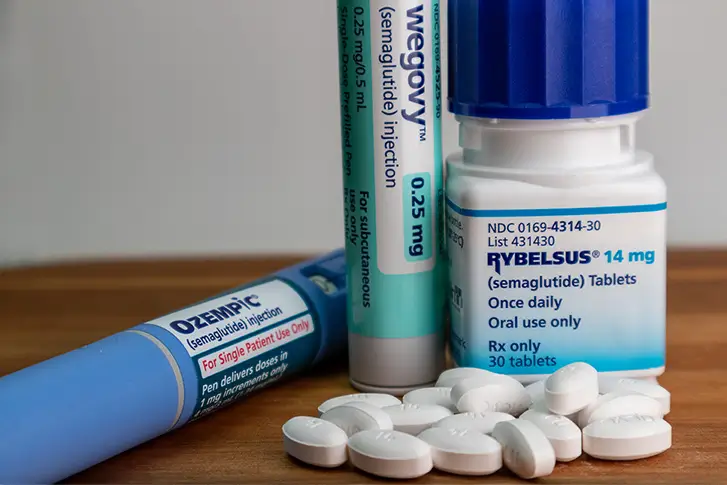Peptide Therapy
Peptide therapy is part of the medical management of obesity. Semaglutide and Tirzepatide are commonly used as part of a strategy for weight reduction. These are strings of amino acids naturally produced in the body but are now manufactured to stimulate the biological effects for weight reduction. They send a signal to the digestive track and the brain that affects food seeking and hunger. One size does not fit all when it comes to personalized medicine. Different dosing regimens can be helpful in mitigating side effects and supporting a weight loss program.
It is essential that dietary interventions work in concert with medications for best results. Exercise is also a critical component for long-term success.

At Sparkle Health, we prescribe peptides for weight management through commercially available pharmaceutical prescriptions (e.g., Wegovy and Zepbound) as well as compounded versions (available in-house) of the medication for wider dosing flexibility and to support an “off ramp” for weaning off medication. We offer these in-house options as insurance coverage of medication has been problematic and sometimes impossible and so that we can further personalize the treatment plan to the individual patient. We collaborate with people to find solutions for the treatment of excess weight.
It is essential that dietary interventions work in concert with medications for best results. Exercise is also a critical component for long-term success.
Quality nutrition is important for health.
It is critical that we target the loss of fat mass rather than muscle mass. Metabolic rate does decrease with weight loss – that means the number of calories you burn at rest. When we add diet quality and exercise to the use of the medication, we are helping your body have the best chance to prevent gaining weight by preserving as much muscle as possible. This will reduce the decrease in the metabolic rate.
Semaglutide is a GLP-1 agonist (Glucagon Like Peptide). That means it mimics the action of naturally produced GLP-1. This is a hormone that is produced by the digestive system in response to food and signals satiety. In this way it helps you become full quicker. It also stimulates the production of insulin which helps to stabilize and lower blood sugar. It also slows down gut motility through its action which when using medications typically lead to the common side effects of nausea and vomiting. The real benefit is over the long term where energy intake is less, and blood sugar is more stable leading to weight reduction.
Tirzepatide is a GLP-1 and GIP agonist. This medication works similarly to semaglutide but has the added impact on GIP (Glucose Dependent Insulinotropic Polypeptide). This medication also stabilizes blood sugar and further impacts the pancreas production of insulin through the added GIP. Over the long term this medication again impacts body weight by lowering blood sugar and reducing caloric intake.
We start these medications with the endgame in mind. Focusing on strength training and quality nutrition and having some “off ramp” pharmaceutical options can be helpful. Unfortunately, there are not enough studies on weight maintenance in the post-GLP era. That is why it is important to monitor closely and find ways to maintain the results of your weight loss efforts. Having access to these medications and having options for dosing is an important part of this strategy.
Related Articles
Oral Semaglutide
January 13, 2026Semaglutide is a GLP-1 agonist. This is a mimic of a hormone naturally produced and helps us feel full and satiated. Until now all GLP-1 medications for weight loss that are commercially available have been injections.Remission of Obesity and creating an off ramp
August 20, 2025The goal of treatment for obesity in the functional medicine model is to achieve remission and improve the “mitigating factors.” The factors that add fuel to the fire and contribute to the chronic condition in the first place.How We Use GLP-1 Matters
August 20, 2025It is not the tool; it is how you use it. The class of obesity medications that focus on GLP-1 and GIP are powerful tools for weight loss. They are not panacea and not a guarantee of weight loss success. Even more importantly when it comes to health, weight is a poor biomarker of health and vitality.



